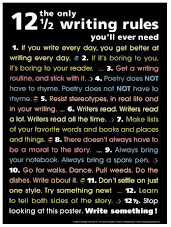Those legends were largely self-created, part of the myth that made the guy so attractive to other writers. How much of it was ever really true, few people know - except maybe people like author & artist Ralph Steadman who will be in attendance Saturday when, as he wished, Hunter's ashes will be blown out of a 150-foot tall cannon/scuplture at Owl Creek Farm where he lived since the late 1960s.
What HST did for young writers is the stuff of legend, if only to goad them to push outward from whatever strictures their particular school system strangled them with when learning to write. I'm not complaining about students being dragooned into learning to spell or punctuate properly. Hell, it's a gripe of mine that will surface like the Loch Ness Monster in a couple of weeks when I'm back in the classroom. Misspelled words drive me bonkers.
No, the strangling I'm talking about is the kind that stifles ideas in favor of form, cuts out strong language and puts in euphemisms, and substitutes mechanics for originality.
That paragraph sounds just like the kind of mouthful of academic crap, by the way, that would probably make HST throwup, though he was a meticulous writer and very careful in what he put down on paper. He hid that side of himself pretty well, preferring the public to think of him as a maniac. It sold more books, though selling books wasn't his goal. He wanted to be heard.
And that's why I'm still pissed off. (There, Hunter, that more the language you would prefer.) I'm totally pissed off because your voice is silent, but still had a lot to say.
And I'm totally pissed off at myself, that in the last few years of your life, I ignored what you were writing because I listened to the critics who said you were washed up and irrelevant and I didn't read what you were publishing.
They were wrong. I was wrong. You were doing some of your best work.
We'll have our own little salute to HST at Seneca Lake Saturday - I'm not exactly sure what just yet - though it probably won't involve any cannons.
Can't guarantee it though. There's more than a few cannons lying about and more than enough madmen & lunatics running about this place with gunpowder and the know-how to touch a cannon off. If a cannon can't be found, maybe a 21-shotgun salute. Every pickup truck seems to have at least one weapon handy for discharging.
Vaya con dios, HST.
Kaboom!














